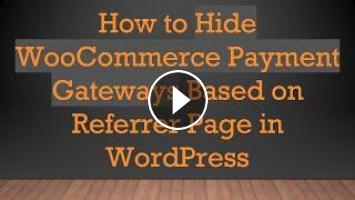Learn how to conditionally hide payment gateways in WooCommerce based on the referrer page using custom PHP code in WordPress.
---
This video is based on the question https://stackoverflow.com/q/73077114/ asked by the user 'George Obonyo' ( https://stackoverflow.com/u/19599775/ ) and on the answer https://stackoverflow.com/a/73085701/ provided by the user 'Howard E' ( https://stackoverflow.com/u/3821467/ ) at 'Stack Overflow' website. Thanks to these great users and Stackexchange community for their contributions.
Visit these links for original content and any more details, such as alternate solutions, latest updates/developments on topic, comments, revision history etc. For example, the original title of the Question was: Hide woocmmerce payment gateways if user comes from given page on wordpress site
Also, Content (except music) licensed under CC BY-SA https://meta.stackexchange.com/help/licensing
The original Question post is licensed under the 'CC BY-SA 4.0' ( https://creativecommons.org/licenses/by-sa/4.0/ ) license, and the original Answer post is licensed under the 'CC BY-SA 4.0' ( https://creativecommons.org/licenses/by-sa/4.0/ ) license.
If anything seems off to you, please feel free to write me at vlogize [AT] gmail [DOT] com.
---
Mastering WooCommerce: Hiding Payment Gateways Based on Referrer Page
In the world of e-commerce, offering the right payment options can significantly affect user experience and conversion rates. However, there are scenarios where certain payment gateways — like PayPal — might not be suitable for specific products or user actions. This guide tackles a common issue: how to hide WooCommerce payment gateways based on the referrer page.
The Challenge
Suppose you are running a digital product shop on WordPress with WooCommerce. You want to hide the PayPal payment gateway when users arrive at the checkout page from a specific referrer, say a page titled "Send Money." The goal is to customize the checkout experience without removing the payment option entirely from your store.
The Initial Attempt
You might start with the following code snippet in your functions.php file to try hiding PayPal:
[[See Video to Reveal this Text or Code Snippet]]
However, you find that this method does not always work due to the way referrer information is managed in sessions.
The Solution
To effectively hide the PayPal payment gateway only when users come from the particular page, we can make use of WooCommerce sessions. Here’s a more robust solution:
Step-by-Step Guide
Check if the user is in the admin area: It's essential to ensure that this logic doesn't affect users in the WordPress admin dashboard.
Store and retrieve the referer: Use the WooCommerce session to store the referrer URL temporarily.
Conditionally remove the PayPal gateway: Only uncheck PayPal if the referrer matches the desired URL.
Implementing the Code
You can use the following refined code snippet:
[[See Video to Reveal this Text or Code Snippet]]
Why This Works
Session Management: By storing the referer in a session variable, we prevent the loss of the referrer data that can happen on subsequent page loads.
Conditional Logic: The conditional check ensures that only users from the designated page will have PayPal removed as a payment option.
Conclusion
Customizing payment gateways in WooCommerce based on user behavior enhances the shopping experience and can help you strategically control your purchasing process. By following the above guide, you can effectively hide the PayPal payment gateway for users coming from a specific page.
Final Thoughts
Implementing such tailored functionalities can lead to better interactions with your customers and potentially higher conversion rates. Be sure to test your implementation thoroughly and adjust according to your business needs!
If you're facing challenges with other WooCommerce payment configurations, don't hesitate to reach out for further assistance!
---
This video is based on the question https://stackoverflow.com/q/73077114/ asked by the user 'George Obonyo' ( https://stackoverflow.com/u/19599775/ ) and on the answer https://stackoverflow.com/a/73085701/ provided by the user 'Howard E' ( https://stackoverflow.com/u/3821467/ ) at 'Stack Overflow' website. Thanks to these great users and Stackexchange community for their contributions.
Visit these links for original content and any more details, such as alternate solutions, latest updates/developments on topic, comments, revision history etc. For example, the original title of the Question was: Hide woocmmerce payment gateways if user comes from given page on wordpress site
Also, Content (except music) licensed under CC BY-SA https://meta.stackexchange.com/help/licensing
The original Question post is licensed under the 'CC BY-SA 4.0' ( https://creativecommons.org/licenses/by-sa/4.0/ ) license, and the original Answer post is licensed under the 'CC BY-SA 4.0' ( https://creativecommons.org/licenses/by-sa/4.0/ ) license.
If anything seems off to you, please feel free to write me at vlogize [AT] gmail [DOT] com.
---
Mastering WooCommerce: Hiding Payment Gateways Based on Referrer Page
In the world of e-commerce, offering the right payment options can significantly affect user experience and conversion rates. However, there are scenarios where certain payment gateways — like PayPal — might not be suitable for specific products or user actions. This guide tackles a common issue: how to hide WooCommerce payment gateways based on the referrer page.
The Challenge
Suppose you are running a digital product shop on WordPress with WooCommerce. You want to hide the PayPal payment gateway when users arrive at the checkout page from a specific referrer, say a page titled "Send Money." The goal is to customize the checkout experience without removing the payment option entirely from your store.
The Initial Attempt
You might start with the following code snippet in your functions.php file to try hiding PayPal:
[[See Video to Reveal this Text or Code Snippet]]
However, you find that this method does not always work due to the way referrer information is managed in sessions.
The Solution
To effectively hide the PayPal payment gateway only when users come from the particular page, we can make use of WooCommerce sessions. Here’s a more robust solution:
Step-by-Step Guide
Check if the user is in the admin area: It's essential to ensure that this logic doesn't affect users in the WordPress admin dashboard.
Store and retrieve the referer: Use the WooCommerce session to store the referrer URL temporarily.
Conditionally remove the PayPal gateway: Only uncheck PayPal if the referrer matches the desired URL.
Implementing the Code
You can use the following refined code snippet:
[[See Video to Reveal this Text or Code Snippet]]
Why This Works
Session Management: By storing the referer in a session variable, we prevent the loss of the referrer data that can happen on subsequent page loads.
Conditional Logic: The conditional check ensures that only users from the designated page will have PayPal removed as a payment option.
Conclusion
Customizing payment gateways in WooCommerce based on user behavior enhances the shopping experience and can help you strategically control your purchasing process. By following the above guide, you can effectively hide the PayPal payment gateway for users coming from a specific page.
Final Thoughts
Implementing such tailored functionalities can lead to better interactions with your customers and potentially higher conversion rates. Be sure to test your implementation thoroughly and adjust according to your business needs!
If you're facing challenges with other WooCommerce payment configurations, don't hesitate to reach out for further assistance!














Commentaires